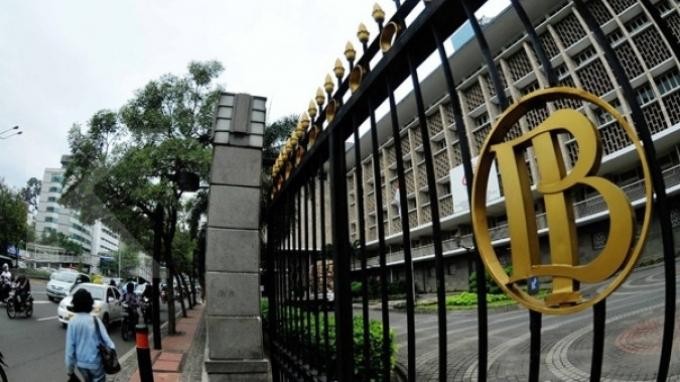Popular Reads
Top Results
Can't find what you're looking for?
View all search resultsPopular Reads
Top Results
Can't find what you're looking for?
View all search resultsBad loans, weak demand hold back credit growth
Change text size
Gift Premium Articles
to Anyone
B
ad loans and weak demand are hurting the outlook for Indonesian banks’ loan growth amid financial authorities pushing for a more affordable lending rate to help revive the national economy.
A lending rate discount of 22 basis points (bps) this year has so far not done the magic of attracting borrowers. Loan growth at commercial banks nationwide averaged 8.71 percent in March, falling far short of financial authorities’ expectations of between 12 and 14 percent this year.
At the same time, a weak domestic and global economy, as well as global commodity price drops, have made it difficult for companies to repay their debts on time. The ratio for bad loans at local banks, dubbed non-performing loans (NPL), rose steadily from just over 1.5 percent in 2014 to 2.8 percent recently.
“When banks experience a higher NPL ratio, they will be more cautious about channeling loans,” BI macro-prudential policy director Yati Kurniati said over the weekend. Especially for new customers whose borrowing behavior remains unknown to the banks, lenders have applied strict requirements to avoid a higher bad loans rate.
The bad loans situation for domestic banks gets more alarming. Bank Mandiri, the nation’s largest lender in terms of assets, reported a gross NPL rate of 2.89 percent as of March this year, from 1.81 percent in the same period last year on the back of soaring bad loans and loan growth contraction.
As a consequence, Bank Mandiri allocated a higher loan loss provision, an expense reserved for defaulted loans, putting pressure on the bank’s net profits to plunge by 26 percent to Rp 3.8 trillion (US$281.2 million) in the January-March period.
Mandiri’s rising bad loans were mainly seen in the commercial segment, which mainly consists of commodity-based businesses operating in regions involved in the exploitation of natural resources.
“A slowdown in economic growth has reduced the loan payment ability of our clients,” Bank Mandiri president director of Kartika “Tiko” Wirjoatmodjo said recently.
Of all stocks, those of banking sector businesses recorded the most significant decrease on the local bourse, indicating investors’ worries about the sector that has been hit by a combination of high bad loans rate, weak credit demand and suppressed net interest margin (NIM) against the backdrop of financial authorities’ efforts to bring down the lending rate.
The finance sector under the benchmark Jakarta Composite Index (JCI) has lost 3.1 percent of its value so far this year, while the index as a whole expanded by 4.83 percent so far this year.
An asset manager Henan Putihrai research team recommended in a research paper a “selective buying position” toward banking stocks as risks have yet to subside, including sluggish credit growth and possible lower NIM, which is the difference between the lending rate banks charge their customers and the deposit rate they charge for depositing funds in the banks.
The government has instructed banks to lower their lending rate to a single digit from the current position of above 10 percent by the end of this year to boost the economy. To achieve the goal, the Financial Services Authority (OJK) is offering local banks that maintain high levels of operational efficiency more leeway to expand their businesses.
But boosting credit growth given the current economic environment remains a Herculean task. Yati of BI said businesspeople would focus more on surviving than expanding their businesses amid a sluggish domestic economy.
Bankers voiced a similar view, projecting that credit demand would remain slow.
Bank Central Asia (BCA) president director Jahja Setiaatmadja predicts that weak purchasing power and decreasing revenues for businesses will reduce loan demand as the effects of the weak economy continue to linger.
“It [the problem] lies more in the weak purchasing power therefore loan demand will increase when our economic growth is better,” Jahja said recently.
BCA, known for its huge consumer banking base, saw loans decline by Rp 9 trillion in the January-March period of this year.
Indonesia’s economy grew slower than expected in the first quarter of this year at 4.92 percent year-onyear (yoy), after growing by 4.72 percent for the whole of 2015, the weakest growth since the 2009 global financial crisis.
As Indonesia’s economy slows down, many companies have put the brakes on borrowing from banks, and are instead seeking funds from the less-costly capital market.
Proceeds from rights issue plans are projected to reach a record high of Rp 67.15 trillion, according to an announcement from publicly listed firms published by the IDX in May. The value even exceeds full year amounts booked in the last five years.
With many big firms, especially those in the commodities sector, slowing down, many banks are now tapping into small and medium enterprises (SMEs), micro loans and consumer loans to seek growth.
Private lender CIMB Niaga plans to tap deeper into those sectors as they still provided room to expand.
“Consumer banking propped up the banking industry’s performance last year,” said CIMB retail banking products head Budiman Tandjung.
The lender’s corporate banking, which contributed 31 percent to its total loans, shrank by 4.7 percent yoy in this year’s first quarter, while consumer banking grew by 2.8 percent.
“This is one of the most promising segments for banking, one that gives stable, regular income and with less volatility in terms of NPL,” Budiman said. (win)
 .(Source: Bank Indonesia/.)
.(Source: Bank Indonesia/.)










